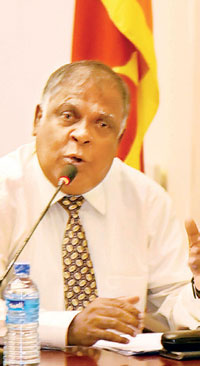14 Jul 2017 - {{hitsCtrl.values.hits}}
An apparel industry spokesperson this week slammed the new Inland Revenue Bill, which will put 90 percent of Sri Lanka’s exporters under the higher 28 percent income tax bracket, continuing to call for support for an industry that has matured.

“The present draft has a 14 percent tax concession compared to 12.5 percent and talks about ‘solely functioning exporters, whereas in this country, exporters have total market access,” Joint Apparel Association Forum (JAAF) Secretary General Tuli Cooray said.
Speaking at the seminar titled: ‘GSP Plus: How Real Is It?’ organized by the Young Professionals Association of the United National Party, Cooray said that approximately 90 percent of Sri Lanka’s exporters will transition to the full income tax bracket if the bill is passed without amendment. “All our agreements with the Board of Investment are to export 80 percent of our production,” he said. Cooray further said that the removal of deemed exports from subsidized income taxes in the proposed law will also hurt the generation of foreign exchange.
“We find that fiscal measures being taken are in fact reversing certain competitive measures that were there, and we will not be able to compete on that basis,” he added.
The new Inland Revenue Bill is said to have been formulated with the help of the International Monetary Fund (IMF), which some say is a replica of the tax laws in Ghana, which the IMF helped draft recently.
The World Bank and credit rating agencies recently hailed the new Inland Revenue Bill as an improvement over the current legislation, for broad basing and simplifying tax collection, and changing the tax concessions to a refund scheme based on realized investments, instead of providing concessions on promises to invest.
Cooray said that exporters have made their representations to the government, and that they are confident of the current exporter base also getting concessionary income tax rates under amendments to the proposed bill.
Bringing the current exporters under the full tax bracket would be positive for the government finances, which are required to reach a 3.5 percent of gross domestic product (GDP) budget deficit by 2020, amidst mounting evidence that the budget deficit target for 2017 may not be met.
Even Central Bank Governor Dr. Indrajit Coomaraswamy had last year expressed concern over major foreign exchange earning sectors such as apparel, tourism and IT not paying taxes at the 28 percent rate. Successive Sri Lankan governments have had a habit of protecting industries, which do not have a competitive advantage, and not removing support for industries that have taken off.
Both policy measures reduce the space for support that can be extended to fledgling industries that could become significant foreign exchange earners in the future. (CW)
10 Jan 2025 37 minute ago
10 Jan 2025 42 minute ago
10 Jan 2025 2 hours ago
10 Jan 2025 2 hours ago
10 Jan 2025 2 hours ago